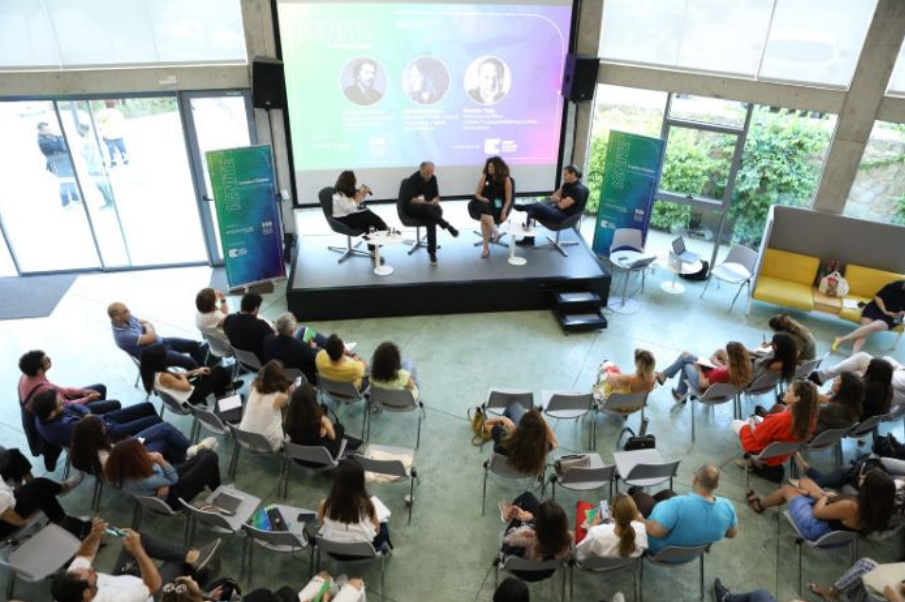Beirut Digital District and Endeavor Lebanon, in collaboration with the Beirut Creative Cluster, hosted IGNITE’s first Creative Chapter in Lebanon, bringing together creative experts from various disciplines. The creative industry in Lebanon has been exponentially growing in recent years, and the latest IGNITE event sought to strengthen bonds in the entrepreneurial ecosystem and connect entrepreneurs to industry experts to fuel further growth.
The IGNITE event kicked off with one-on-one meetings between entrepreneurs and experts in various realms, followed by a keynote address tackling the shifts in the creative industry. International creative force Jochen Rädeker, Co-founder and Managing Partner of the design agency Strichpunkt, headlined the talks, sharing his expertise in the creative world. Strichpunkt, operating at the interface between design and technology, has ranked amongst the top 10 creative companies for many years. His presentation aimed at exposing Lebanese talent to international best practices. (Read tips from Rädeker on how design agencies can capture growth here).
A panel discussion then ensued, bringing together industry experts who discussed various topics and transformations in the creative industry. The panelists included: Ramsey Naja, Chief Creative Officer at J. Walter Thompson Middle East & Africa; Joe Abou-Khaled, Regional Creative Director at Impact BBDO MENA; Nathalie Fallaha, Founder and Design Principal at vit-e branding + digital; Fadi Sabbagha, Founder & CEO at Born Interactive, and Boudy Nasrala, Partner at Wondereight.
The experts highlighted that an evident change stems from what clients are demanding. Changing client requirements were highlighted by the expert panelists, with focus on growing expectations. They chimed in on how to deliver on these expectations, and how brands are being redefined.
Naja: “Clients are always demanding an immediate return on investment and very quick results, which gives very little time to know the brand in depth. The focus is shifting very rapidly to user experience, as if it is what defines the brand completely.” He advises that companies should focus on both on building the brand and on user friendliness.
Fallaha: “Firstly, there is a huge difference between a sustainable brand and sustainability of a brand. A sustainable brand is one that has a long lasting and durable competitive advantage. The sustainability of a brand leverages on green, human capital and social impact.” Fallaha outlined the characteristics of a sustainable brand which include: being timeless, having its own conscience and revolving around the 6 C’s: credible, committed, consumer oriented, conversational, cooperative and consistent.
Another notable change is how brands are shifting to storytelling, with one-way communication becoming a thing of the past. The trend adopted by brands and their respective creative agencies has been to enter an era of storytelling. How companies can best tell stories through online and offline platforms was outlined by Abou-Khaled.
Abou-Khaled: “Brands should be honest, and honesty it is at the heart of the brand experience and its offering. Storytelling can lead to beautiful brand relationships and at the heart of shaping and building a brand and engaging with consumers. Brands need to be human, engage positively and emotionally with the audience in order to build consistent and beautiful storytelling and take from one channel to the other.”
The era of personalization has also been welcomed, as masses have become fragmented, and the customer now exists as a unique individual. Companies are responding to this change by personalizing their brand journey and approach. Industry experts shared how to adapt to this change:
Abou Khaled: “When a brand has a unique story, is honest, consistent and humane, then the brand is not putting the employee and the product at the center of its storytelling, but rather putting the consumer at the heart of the story.”
Fallaha: “Focus on wearables and not FMCGs. Always make sure you open up possibilities as opposed to framing the options it will allow a much richer conversation and engage in a better way with the audience.”
As brands adopt a storytelling approach, and personalization / customization becoming a key offering, technology is pushing companies to explore untapped creative areas. In every industry, technological disruptions are bringing about changes at immense speeds. Creative agencies are now being forced to understand and adapt to these changes.
Naja shares his personal philosophy, adding that: “You should accept and be quick reaching to where the industry is now and to learn and go back to school as quickly as possible to educate yourself with all the updates happening in the industry to be able to adapt and stay in the lead.”
With the various challenges, opportunities and expectations that exist today, being competitive has become a more difficult feat. The founders and heads of two leading creative agencies in Lebanon discussed how companies can find their edge and stay relevant.
Nasrala: “When scaling your business, think about scaling in the skillset of your team and not only the size of your business. It is not only about scaling the business in general but mainly about adapting to the client’s needs.”
Sabbagha: “The key points to scaling and growing is to be customer centric, independent, to adapt to the fast-changing transformations in the industry and to find creative and complete solutions to all the clients.”




